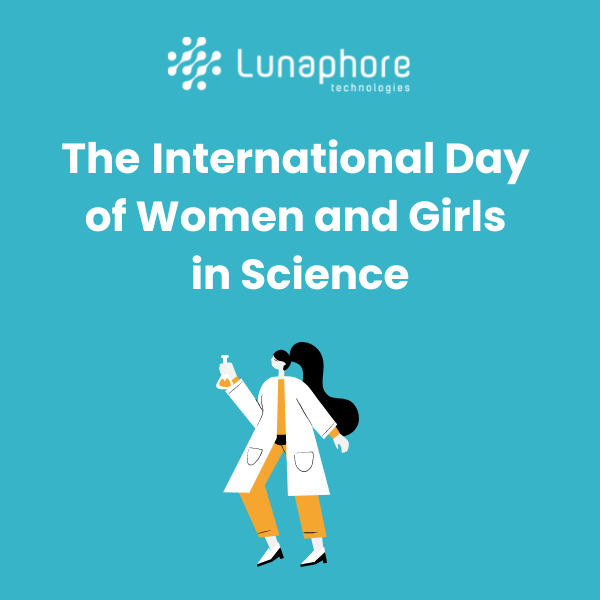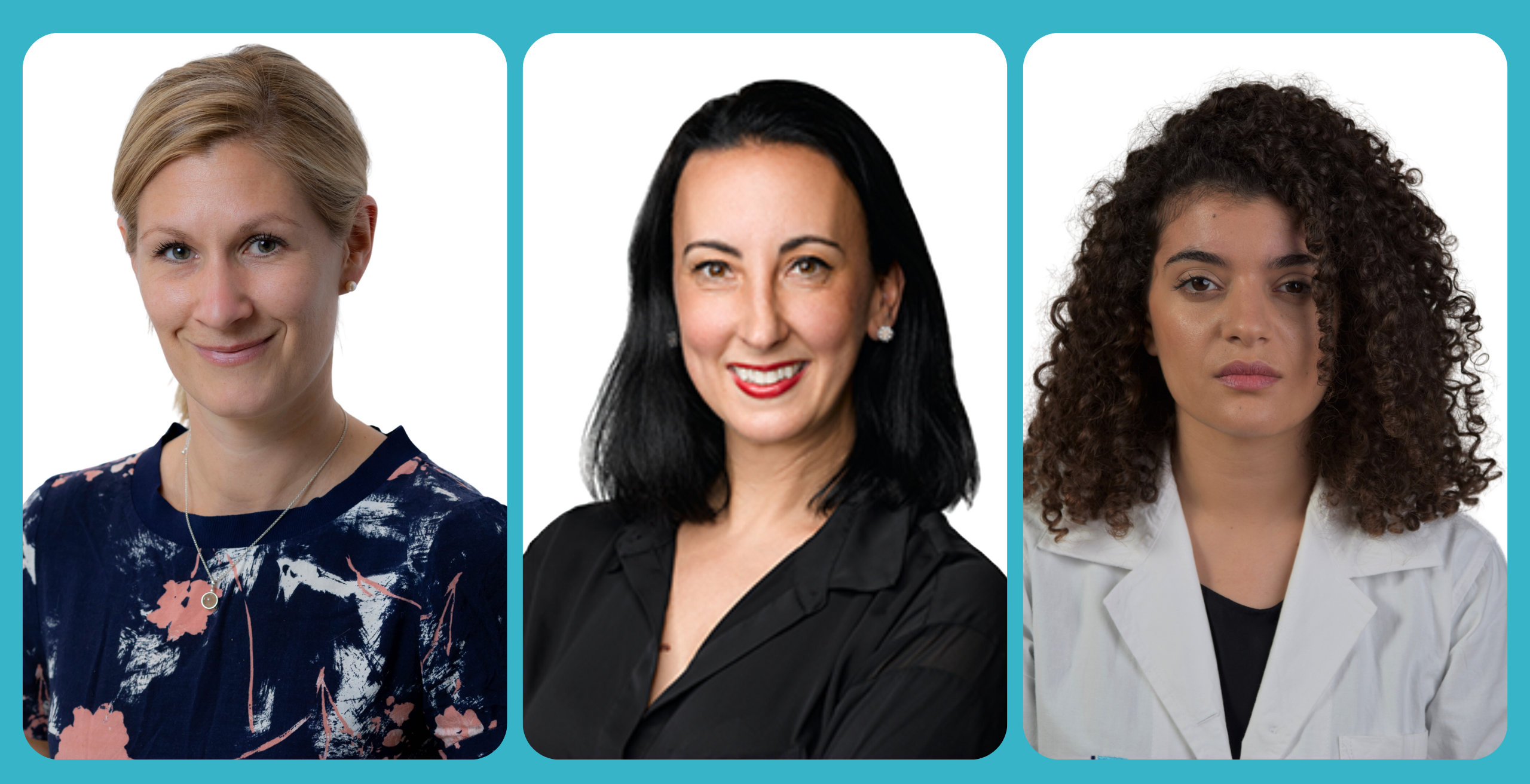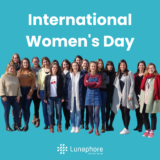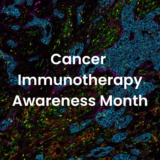Interview
Conversations with inspiring women in science:
the path to becoming a successful female scientist
Posted on:

Despite the significant progress women have made toward increasing their participation in higher education, a gender gap persists throughout the years at all levels of science, technology, engineering, and mathematics (STEM) disciplines worldwide. In an effort to shine a light on the women who paved the way for a better society through their involvement in sciences, in 2015, the United Nations General Assembly adopted the International Day of Women and Girls in Science to emphasize the need for equal opportunities for women and men in STEM-related fields.
At Lunaphore, we want to highlight female role models and their work in STEM, to inspire the next generation of women to pursue careers in sciences. In this blog series, we share stories of women who are changing the world through their effort in their respective fields and have made a significant contribution to a positive change in attitude towards gender roles.
Today, on the International Day of Women and Girls in Science, we are delighted to profile leading scientists from prominent research institutions and core facilities in the spatial biology field: Dr. Charlotte Stadler, Head of the National Spatial Proteomics Facility and Co-Director at the Spatial and Single Cell Biology Platform at SciLifeLab; Prof. Inti Zlobec, Professor of Digital Pathology at University of Bern; and Dr. Hinda Joseph Najem, Post-doctoral Fellow at Northwestern University.

You developed different interests within scientific disciplines during your academic studies. Did you have female inspirations who served as a turning point in your decision to pursue a career in science? Who were your biggest inspirations throughout your career?
Dr. Najem: I got introduced to fundamental sciences during my last year of pre-med. My goals and career objectives became clear after my exchange program at MD Anderson Cancer Center (MDACC), in the Department of Neurosurgery, where I got to work with pioneers in the field like Prof. Sujit Prabhu [Professor in the Department of Neurosurgery at UT MD Anderson Cancer Center and an Adjunct Professor at the Baylor College of Medicine in Houston] and Prof. Amy Heimberger [Prof. Heimberger is now the Vice Chair for Research, Department of Neurological Surgery, Jean Malnati Miller Professor of Brain Tumor Research, Professor of Neurological Surgery, Northwestern University]. This was when the true story began. I was eager to move forward in my career and get the hands-on experience in the field I had been fighting for, and Dr. Heimberger gave me that opportunity. Now, there is no turning back for me; my compassion and enthusiasm for this field run deep and keep growing, thanks to her mentorship.
Dr. Stadler: It all started when I worked with the Human Protein Atlas as part of my master’s thesis. When I started my Ph.D. studies, Prof. Emma Lundberg, a pioneer within subcellular spatial proteomics, became my supervisor; since then, she has been my biggest inspiration and role model. It has been ten years since I got my Ph.D. We still work together, and she is the one I turn to for advice. [Prof. Lundberg is now an Associate Professor of Bioengineering and Pathology, Stanford University]. Much later in my career, it was a couple of years ago; my mother passed away from ovarian cancer. All she went through makes me extra dedicated and wanting to contribute to how these new technologies could be used to improve cancer diagnoses early on. It is not exactly an inspiration but rather an inner drive to make things better so that people, maybe now or maybe in five or ten years, will not have to face the same destiny as she did.
Dr. Zlobec: I believe my interest in science was always undeniable. I was taking physiology courses, and I still remember when we dissected a fetal pig. For the first time, I saw how anatomy and function are connected, a truly fascinating experience. Later during the histology and anatomy courses, we worked with patients who donated their bodies to science, which was another turning point. Then, I was lucky to have two powerful female role models who paved the road for me early in my career. The first was Dr. Carolyn Compton, the Chair of the Department of Pathology at McGill University at the time. Even though she was extremely busy, she always had time for me. It was a fundamental lesson that I learned. The second person was Prof. Nilima Nigam, a mathematician working at McGill University. She was also one of those people who had been fighting for her career by being a strong female in a male-dominated area.
What are the most fulfilling aspects of being a scientist?
Dr. Zlobec: The knowledge that I can make a difference, maybe the research that I do, will be able to make a difference in somebody’s life in the future. The other thing is seeing my students embracing this environment, seeing them enjoying learning, and becoming excellent in their work.
Dr. Stadler: Being in a position where I can contribute to drive reserach forward for the benefit of future generations. And the ability – and responsibility – to inspire younger scientists and students in the field. I meet a lot of young researchers and students in my role, both from projects but also during different recruitments I have done over the years.
Dr. Najem: What is the most fulfilling for me, as a woman neuroscientist and physician, is being an example to other younger generations, teaching and encouraging them to speak up and engage. This field is a lifestyle, hard for everyone, with the same endurance, commitment, and intellectual capabilities that both women and men have proven to possess.
Can you tell us about an achievement you’re particularly proud of?
Dr. Najem: Being the person I am today despite all the challenges and difficulties I faced, and I am facing in my career and personal life. I am still early in my career, but looking back two and a half years ago and now, I can say I have surpassed the first small mountain. A lot higher peaks are still ahead, but I am always up to the challenge when I am surrounded by my mentor and family.
Dr. Stadler: I am a person who likes to see concrete results from specific achievements. However, I have realized that when something stands out and rewards you, it is most often a result of a long-lasting effort. So I’m most proud of everything together, the road I have taken, and where this has taken me. When I got my Ph.D. I did not know exactly what I wanted to do. Now I have established a lab with a great team and the benefit of working with some of the latest technologies and platforms. This has also given me a fantastic network, and I am convinced that what I do today will influence what happens tomorrow – or next year.
Dr. Zlobec: In terms of non-scientific achievements – mentorship. Two of my students won prizes, both females and both very early in my career. Just to be able to transmit my passion to them, get them motivated for their task, and see how they developed over time. The second thing would be my own position: extraordinary professorship in digital pathology in a clearly male-dominated field. Having this position at the university where the numbers will indicate around 20% women at higher professorship levels within the medical faculty. This is something that I have to say is quite an achievement.
What are the primary skills to build your career in science and engage with others in the scientific community?
Dr. Zlobec: Being a great scientist is not enough. If you cannot communicate your ideas in a way that others can understand their importance, then there is something that is not balanced out. You require the ability to face difficult questions when interacting with people who are not always on your side. It is important to stay open-minded, willing to listen to other people’s ideas, even if you disagree, and to contemplate them.
Dr. Stadler: As this field can be tough and very competitive, it is important to be grateful and not forget your accomplishments when things are not going your way. Try to be respectful and communicative with anyone you interact with, no matter if this person is above or under your seniority level, and show the best version of yourself every day. Every situation has the potential to affect your life in the future.
Dr. Najem: Interest, excitement, and anticipation of learning should drive you to begin such a career. Also, the willingness to commit is as essential. This field is a long, tedious pathway that needs patience and endurance. Another critical point is choosing the right environment, surrounded by scientists, mentors, and comrades that will help and teach you along the way, pushing you further to grow. However, being open to others’ criticism and comments is key; the more you are bombarded with criticism, the more you learn.
What advice would you give to your female colleagues and the next generation of women in science?
Dr. Stadler: Believe in your own value and be confident. Know the impact that you are making; you should not let anyone else take advantage of you. Of course, always be polite, but also determined. Do not be afraid to ask questions; as we often say, there are no stupid questions.
Dr. Zlobec: The first thing is surrounding yourself with positive people and positive energy. Do not settle for something when you think you could do better because of somebody else’s pressure. Do not settle because you are afraid. Do not settle just for being okay.
Dr. Najem: Fear of failure is natural, and so is being anxious about your future. Embrace the change and have the courage to ask for help and advice when needed. Always put yourself and your health first; everything else comes with it. Choose your mentor wisely; this person is the one that will make you achieve your goals and guide you along the way.
How about your personal life? What are your main interests outside of your job? How do you keep your work-life balance?
Dr. Najem: Outside of my job, I like music, reading, and sports. I have been a singer since I was young, I still take vocal classes, and I am a member of a choir and a rock band. I started exercising again regularly, going to the gym, jogging, etc., which makes me happy and in shape.
Dr. Stadler: I have not nourished my free time as much as I should over the last few years, but I have many other interests, such as singing, yoga, and gardening. Going to the garden and taking care of my plants is very relaxing. Everything is quite concrete. I think it reminds me that what I do everyday matters, and seeing the results and outcome of that effort is rewarding.
Dr. Zlobec: You have to make time for the important things. I am a fitness instructor outside of the Institute, and when I have my fitness classes, I cannot say that I am not able to make it because I am busy. However, I am always so busy at work that I will never go if I try to finish everything. So, I have the craziest time management, but at the same time, I believe that spending time on what we like is like is recharging our batteries, giving us an enormous amount of motivation.
Related Articles
Conversations with women in leadership – International Women’s Day 2023
Posted on 08 Mar 2023
Read PostInterview with Dr. Janis Taube: raising awareness about cancer immunotherapy
Posted on 29 Jun 2023
Read Post
